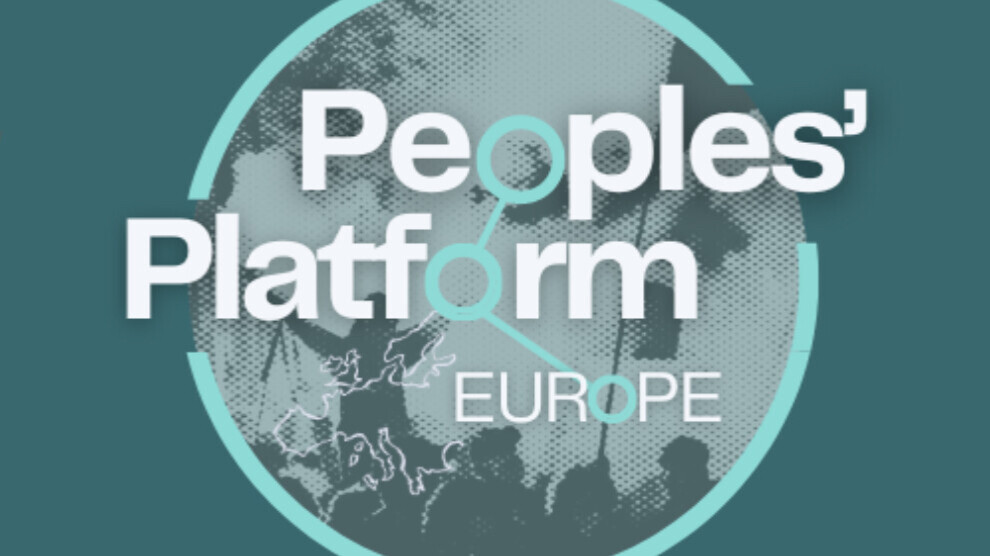“Peoples’ Platform Europe” meeting in Vienna
Around 700 delegates from over 160 organizations, groups, movements, networks and associations in more than 30 European countries will meet at the “Peoples’ Platform Europe” in Vienna in mid-February.
Around 700 delegates from over 160 organizations, groups, movements, networks and associations in more than 30 European countries will meet at the “Peoples’ Platform Europe” in Vienna in mid-February.

Progressive, left-wing, socialist and ecological activists from across Europe will gather in Vienna in February for a major conference to strengthen the grassroots organization. The three-day event “Peoples' Platform Europe” from February 14 to 16 will bring together about 700 delegates representing 160 organizations, groups, movements, networks and associations from more than 30 European countries.
The platform, organized under the motto “Reclaim the Initiative”, is the culmination of nearly a year of planning under the direction of the Academy of Democratic Modernity (ADM). Among the participating groups are environmentalists, youth movements, women's rights organizations and various collectives for social justice.
According to the organizers, the conference aims to develop strategic responses to current social and economic challenges while building stronger networks between European activist communities. The gathering is one of the largest progressive organizational conferences in Europe this year.
160 organizations and 700 delegates from over 30 countries
The platform will bring together participants from Austria, Italy, Slovenia, the Basque Country, Catalonia, Ireland, Greece, Cyprus, France, Scotland, Finland, Switzerland, Slovakia, Bosnia-Herzegovina, Romania, North Macedonia, Portugal, Serbia, Hungary, Albania, Denmark, Belgium, Sweden, the Netherlands, Spain, England, Germany, Turkey and Kurdistan. During the three-day gathering, the delegates will participate in nine intensive workshops focused on developing new strategies and perspectives for the grassroots organization across Europe.
Among the many participating organizations are “Non Una Di Meno” and “Potere al Popolo” from Italy, “Solidaires Union Syndicale” and “Les Soulèvements de la Terre” from France, “Askapena” from the Basque Country, “Endavant OSAN” from Catalonia and “Confederación General del Trabajo” from Spain. Also participating are Rouvikonas from Greece, Dunja Social Center from North Macedonia, Interventionistische Linke from Germany and Women's International League for Peace and Freedom from Austria.
Other participating organizations are the “Partija Radikalne Levice – PRL” from Serbia, “Rede de Apoio Mútuo” from Portugal, “Slí Eile - Action for a Planet Beyond Capitalism” from Ireland and “Union of Cypriots” from Cyprus. International networks will be represented by the Transnational Institute of Social Ecology (TRISE), the Network for an Alternative Quest, Jineolojî Europe, the International League of Peoples Struggle (ILPS) and Ronahi - Youth Centre. Among the better-known delegates is Greta Thunberg, who represents the European environmental movement Fridays for Future.
Opening and panel discussion “Reclaim the Initiative”
The Peoples' Platform Europe will begin on Friday, February 14, 2025, with an opening speech and cultural performances in the morning. This will be followed by a panel discussion on the topic “Reclaim the Initiative”, featuring lectures by American professor William I. Robinson on “The epochal crisis of global capitalism - challenges for the people's resistance from below”, by Mireille Fanon, president of the Franz Fanon Foundation, on “The 100th anniversary of Franz Fanon: Between Race and Class” by the Italian-American philosopher Silvia Federici on ‘For an international feminist movement against capitalist patriarchy and its ongoing war against social reproduction’ and the Irish-Mexican professor John Holloway on ‘Perspectives in the storm’.
Workshops
The topics of the nine workshops that make up the platform's main agenda are as follows: “War and Peace”, “Anti-Fascism”, “Ecological Resistance”, “Democratic Women's Confederalism”, “Youth Identity and Resistance”, “Building Autonomy”, “Activism and Organization”, “Resisting the Politics of Genocide” and “Democratic Media”.
The results of the discussions in the workshops will be submitted to the platform in the form of presentations. On Sunday, February 16, long-term and joint strategic plans will be discussed and decisions will be made with the participating components under the title “Roadmap of the Peoples' Platform Europe”.
The Peoples' Platform Europe will end with a special session and the establishment of a coordination network.
Inspired by Abdullah Öcalan's perspective of “democratic world confederalism”
ADM spokesperson Ali Çiçek stated that left-wing and progressive organizations and sections of society across Europe have been more defensive in their politics in recent years, and continued: “The idea of the platform emerged as a result of the discussions we held on the basis of the perspective of a global democracy movement by Abdullah Öcalan, the architect of the theory of democratic modernity.”
Çiçek emphasized that the ADM is involved in discussions with system-critical movements in order to implement the perspective of “Democratic World Confederalism”: “Within the framework of the platform, we will evaluate the major social crises such as the climate collapse, the rise of authoritarian regimes, the spread of fascist parties and the wars taking place worldwide. It is the capitalist system that has caused these crises, and struggles are needed to counteract this serious picture and develop social responsibility. Our aim is to present common perspectives and strategies for struggle that emerge from discussions with grassroots organizations that do not aim at parliamentary politics and are based on radical democracy.”
Women will make up half of the participants
Oona Elvers, one of the spokespersons of the network “Women Weaving the Future”, which was involved in the preparation of the platform, emphasized the significant participation of women, saying: “The range of participants will be very diverse. Representatives of ecological and cultural groups and networks will be present, especially from the left, socialist and women's movements, as well as from feminist organizations. In addition, activists and representatives from trade unions, left-wing academic collectives, student organizations, democratic media and diaspora organizations of various peoples will participate.” Oona Elvers pointed out that women will make up half of the participants.